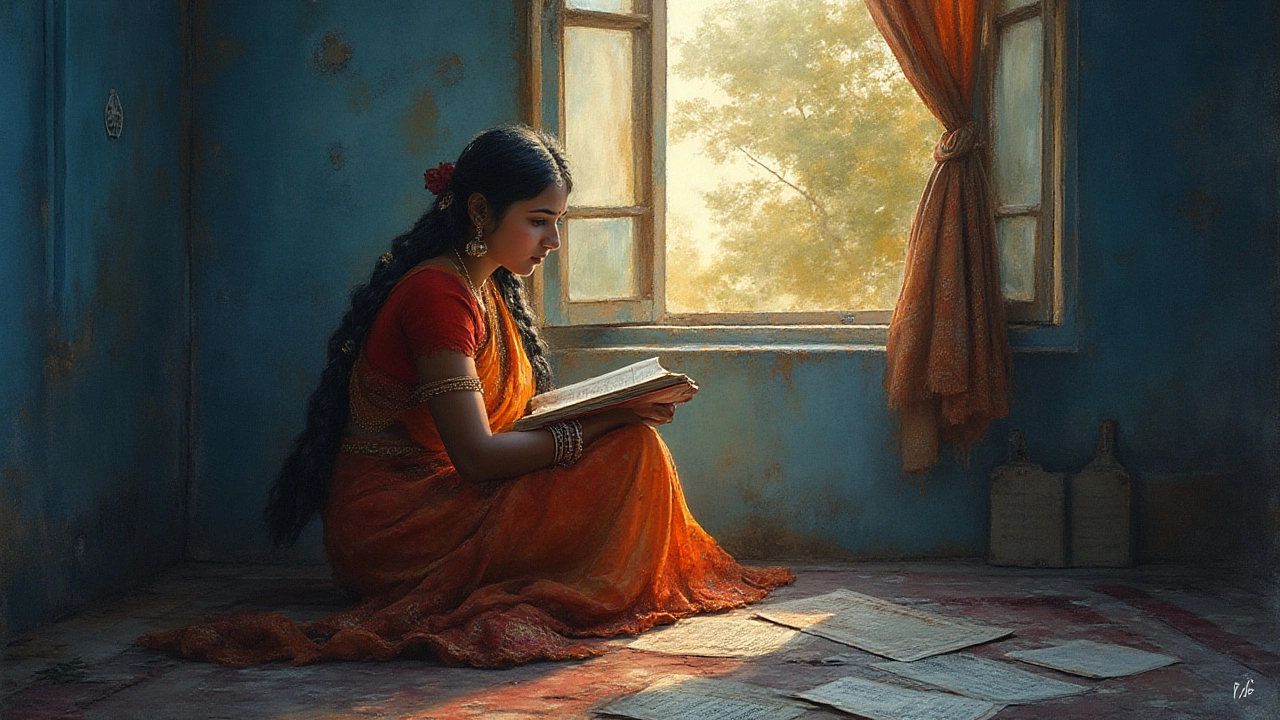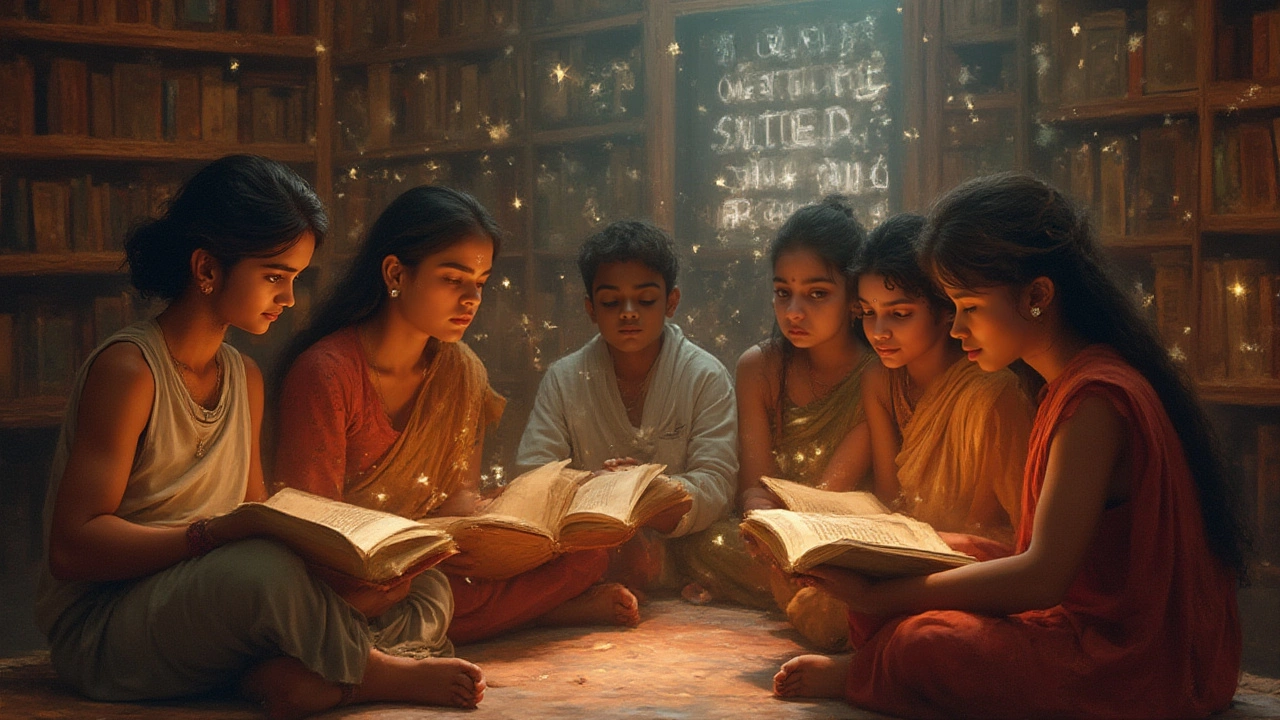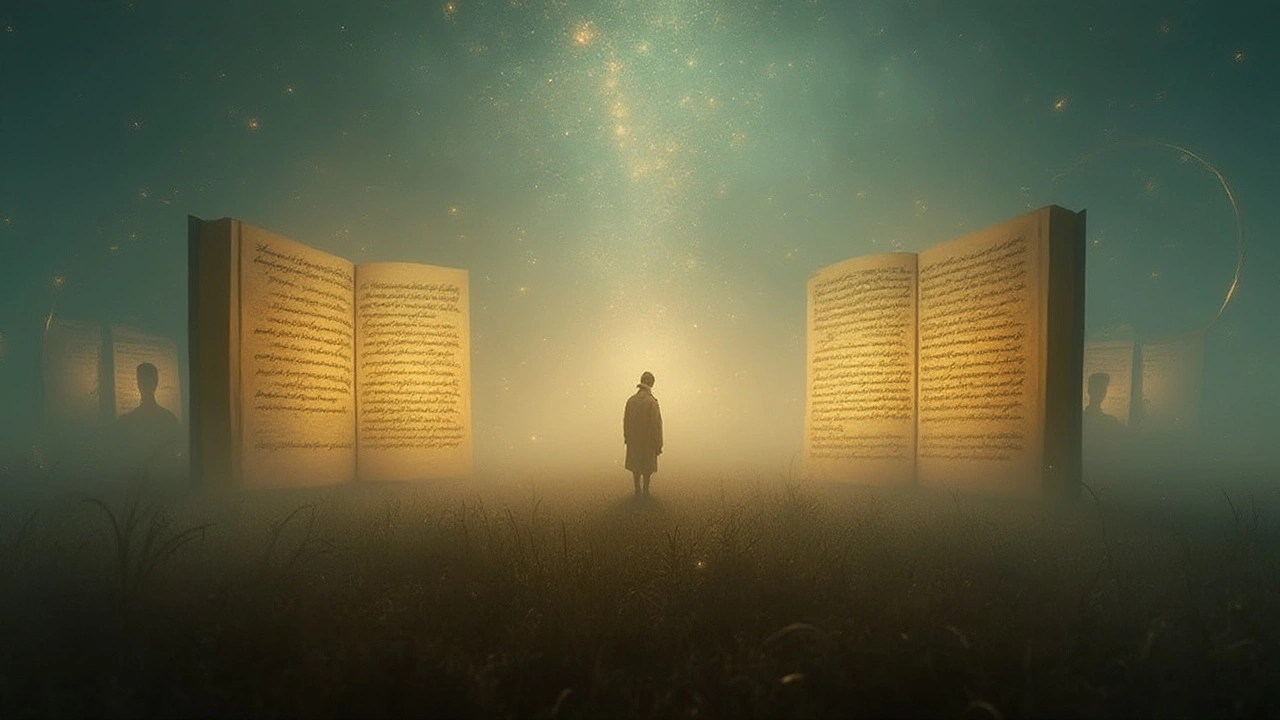Exploring the Epic Poem About Depression: Meaning, Impact, and Modern Relevance
 Jul, 18 2025
Jul, 18 2025
Think about the moment you’re sitting with your thoughts and suddenly an old poem echoes in your mind—one so big, so raw, that it puts heavy feelings into words. That’s the power of epic poetry delving into depression. We’re not just talking about quick rhymes you’ll find on an Insta story; we’re talking sweeping stories that wrap entire lives, mindsets, and the agony of mental struggle into verse. Centuries before mental health hashtags or online therapy, these poetic works gave voice to the kind of sadness we now call depression. People still reach for them, finding bits of themselves in every line, even if the words are hundreds of years old.
The Epic Poem: Telling the Story of Depression
Let’s make one thing clear, when most folks think of epic poems, their minds jump to tales of gods, heroes, or kingdoms—think Mahabharata, Odyssey, Beowulf. But buried within these battles, betrayals, and victories are passages where the heroes are almost crushed by their own minds. Here in Delhi, a lot of us grew up hearing parts of the Ramayana or Mahabharata, maybe not always knowing these epics also tackled depression, anxiety, and even existential dread. But they did.
Take the Mahabharata, for example. Arjuna (my namesake, actually) stands on the battlefield of Kurukshetra, wracked by doubt, fear, sadness so deep he can’t lift his weapon. Sound familiar? That’s what modern psychologists would call a depressive episode. Instead of ignoring it, the entire Bhagavad Gita unfolds from that moment. Krishna counsels Arjuna through his despair, using words that to this day are quoted by therapists and spiritual guides alike. The words, "You have the right to work, but not to the fruits thereof," echo the feeling of being stuck but push towards action despite hopelessness—a classic cognitive therapy move.
It gets more intense when you look at other epic poetry from around the world. In Dante’s Divine Comedy, he starts in a dark wood, having lost his way—he literally writes about not knowing how to escape his own mind’s spiral. In Homer’s Odyssey, Odysseus is stranded, beaten by life, plagued by isolation, deep sadness, and longing for home—pretty close to how depression feels when you’re cut off from the world and your own sense of self. These are not just sad lines; they’re blueprints for understanding the depths of depressive feelings centuries before depression had a medical name.
What sets epic poetry apart is its ability to make depression universal, while also providing a kind of secret map out. No Instagram post, no WhatsApp forward, can really match the power of reading about someone—heroic or ordinary—who goes through darkness and not only survives but shapes history. We’re trained to think of depression as stifling, but these epics show it can prompt reflection, even transformation. In fact, the ancient Indian idea of 'chitta-viksep' (disturbed mind) was discussed by ancient poets and rishis long before psychiatry arrived here.
Check out this table showing a few famous epic poems and where they deal with depression or deep emotional pain:
| Poem | Origin | Main Depressive Episode | How It's Addressed |
|---|---|---|---|
| Mahabharata | India | Arjuna doubting himself pre-battle | Dialogue with Krishna (Bhagavad Gita) |
| Ramayana | India | Rama exiled, grieving separation from Sita | Reflection on duty, friendship, and faith |
| The Divine Comedy | Italy | Dante lost in a dark wood (allegory for depression) | Guided journey through Hell, Purgatory, and Paradise |
| The Odyssey | Greece | Odysseus lost at sea, weary and weeping | Persistence and longing for home (nostos) |
| Shahnameh | Persia | Rostam mourning Sohrab | Lamentation, acceptance of fate |
Each of these brings out how epic poems don’t just recount battles with monsters or gods but also with the monsters inside—a struggle that’s sometimes even more epic.

Why Epic Poems About Depression Still Matter
When was the last time you shared a poem with someone and felt genuinely understood? Or read a line that eerily matched what you were feeling on your worst day? That’s why these old epics about depression still stick. They help us realise we’re not the first to face the void, and we won’t be the last. Right now in Delhi, thousands of teens turn to old Hindi kavitas or admit they cry to Urdu couplets. This isn’t nostalgia—it’s therapy, just without the bill.
Modern psychology is catching up to what epic poets have always done—name the feeling, speak it aloud, and create meaning out of suffering. Even the clinical term 'depression' only entered regular medical use in the 20th century, but poets like Bhartrihari (with his shatakams), Mirza Ghalib, and Valmiki wrote verses about inner emptiness centuries ago. Studies out of AIIMS Delhi from 2022 found that poetry therapy sessions reduced significant depressive symptoms in 65% of participants—especially when those poems reflected the reader’s cultural roots. In that way, reading or even memorising epic poems can be a little like borrowing resilience from the past.
We can’t really talk about epic poems and depression without mentioning how they give language to feelings that otherwise stay hidden. Ever tried explaining depression to someone who’s never felt it? Frustrating, right? Now think about this line from Mahabharata: "My mind is unsteady, and my heart is lost in sorrow." This one sentence, written thousands of years ago, cuts through any cultural or time barrier. That’s probably why giant epics are still part of school curricula, literary festivals, and even pop culture TV shows (Mahabharata is always rerun, and new versions of Gita keep popping up on store shelves).
The power of an epic is its ability to frame depression as part of life, rather than something shameful. Hidden right alongside tales of violence and victory are reminders that even the biggest legends struggled with loss, grief, and inertia. Our parents and grandparents might hide their mental struggles, but you can bet their grandparents knew the power of a good verse recited in the dark.
If you feel like you’re wading through your own personal epic, that’s more common than you think. Depression doesn’t care about culture, age, or status. During Covid-19, studies out of Mumbai reported a 25% jump in reported depressive symptoms among students and working professionals, and Google searches for Gita quotes and Ramayana stories doubled in the same year. People still reach for epics when nothing else works.
- Tip: Try reading a passage aloud, especially one where the hero is at their weakest point. Something about hearing your own voice say the words shifts things inside.
- Tip: Rewrite a stanza or paragraph from one of India’s epics as if it’s happening today. You’ll feel how timeless the struggle with depression really is—and how much strength it takes to keep going.
These poems aren’t cures. They don’t replace therapy or medication. But they can make the worst days bearable, and the darkness less lonely.

Turning the Epic Into Personal Power
After reading so many ancient tales, it’s tempting to think, "Yeah, but that’s just literature." Truth is, epic poems have always been about more than entertainment; they offer a roadmap for how to live and suffer and still find meaning. Here in Delhi, whether at a chai stall in Connaught Place or a south campus hostel, you’ll find people quietly swapping verses from Kabir or the Rubaiyat. It’s not just culture—it’s survival, sharing pain to lessen the load.
Let’s get real—modern life piles it on. Jobs, relationship drama, social pressure, and even air pollution (Delhiites, you feel me?) make that heavy feeling in the chest pretty common. But these epic poems didn’t shy away from those struggles. The way they help is by showing the rhythm of suffering and rising. Just visualize Arjuna frozen on the battlefield, or Sita’s endurance in the forest. Every epic’s hero is brought to the edge by their own sadness or fear. Every section of these poems is a rehearsal for standing up again, even if in small steps. That’s bigger than any Instagram motivator you’ll follow.
It’s worth noting how often Indian parents use a verse or doha to express what they can’t say outright. That’s because the language of epics is subtle, but direct. When someone quotes a couplet—"Sorrow comes, sorrow goes / Like clouds across the sky"—they’re not just being poetic, they’re saying, "I get it, and you will survive this." And even if you don’t believe it in that moment, the verse hangs in your mind for days, maybe helping you get through one more tough night.
A lot of people will tell you to "power through" your sadness. Epic poems never say that. They give space to sadness, let it breathe, then move through it with honesty. Imagine if more people wrote their stories that way—how much easier it might be to talk about depression and not feel weak for it. Some modern writers, like Jeet Thayil in English or Gulzar in Hindi, channel that same epic tone. They make room for long, messy feelings in their poems. It’s proof that depression in poetry isn’t stuck in the past—it’s the present and future, too.
So, what do you do if you want to make the most of these epic poems? Start a notebook. Copy your favorite lines. Recite them in the shower or before sleeping. Share them with a friend who’s hurting. Or challenge yourself to write a new epic, putting your own battles into verse, however rough the first draft feels. The point isn’t to create a masterpiece—the point is to mark your struggle, like Arjuna did before picking up his bow again.
- Tip: When you're feeling lost, pick a random passage from one of these epics. You’ll almost always find a hero who’s as lost as you. Notice what lifts them up. It could become your own secret mantra.
- Tip: Use poems as conversation starters if someone close to you seems low. "Have you ever read this quote from Gita...?" is less confrontational than “Are you depressed?” Sometimes, poetry opens doors regular words can’t.
The most important thing is not to treat depression as a battle you have to win alone. Epic poems say—that’s never been true. Heroes always need guides, friends, or the wisdom of old words. Epic poem about depression isn’t just a relic; it’s a living, breathing toolkit. Next time sadness hits, reach for it. Who knows? Maybe, like generations before, you'll find just enough courage in a verse to step into the daylight one more time.